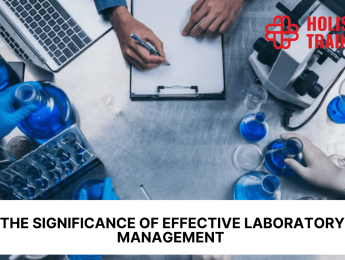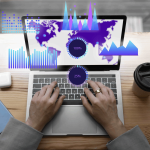- Table of Contents
- Introduction
- What Is Laboratory Management?
- The Principles of Laboratory Management
- 1. Quality Assurance and Control
- 2. Safety First
- 3. Efficiency and Resource Optimisation
- 4. Compliance and Ethical Conduct
- 5. Continuous Improvement
- Why Is Laboratory Management Important?
- Ensures Data Accuracy and Reliability
- Enhances Safety
- Optimises Resource Utilisation
- Compliance and Accountability
- Facilitates Innovation
- The Duties of a Lab Manager
- 1. Personnel Management
- 2. Resource Management
- 3. Quality Control
- 4. Safety Compliance
- 5. Budget Management
- 6. Project Management
- Lab Management Process
- 1. Assessment and Planning
- 2. Resource Allocation
- 3. Quality Assurance
- 4. Safety Measures
- 5. Documentation and Record-Keeping
- 6. Maintenance and Calibration
- 7. Data Analysis
- 8. Continuous Improvement
- How to Organise a Lab
- What Does Poor Equipment Management Lead to?
- Inaccurate Results
- Downtime and Delays
- Safety Hazards
- Increased Costs
- Loss of Credibility
- Why ISO Calibration Is Essential to Your Laboratory
- 1. Accuracy and Reliability
- 2. Consistency
- 3. Compliance
- 4. Traceability
- 5. International Recognition
- How Do You Become a Lab Manager?
- a. Educational Background
- b. Gain Experience
- c. Develop Leadership Skills
- d. Pursue Further Education
- e. Network and Seek Opportunities
- f. Apply for Lab Manager Positions
- g. Continued Learning
- The Future of Lab Management
- 1. Automation and Robotics
- 2. Data Analytics
- 3. Remote Monitoring
- 4. Sustainability
- 5. Digital Lab Notebooks
- 6. AI and Machine Learning
- Conclusion
Introduction
In the realm of scientific discovery, laboratories stand as the crucibles where innovation, research, and experimentation converge to unravel the mysteries of the natural world and drive technological progress. These hallowed spaces are not merely equipped with an array of advanced instruments and cutting-edge technology; they are orchestrated and guided by the skilled hands of laboratory managers.
Laboratory management is the unseen force that orchestrates the symphony of scientific inquiry. It is the meticulous planning, the precision in execution, and the unwavering commitment to quality that underpin the credibility and reliability of scientific research and testing. Yet, it often operates behind the scenes, like a well-concealed conductor ensuring that every instrument harmonises flawlessly, culminating in a masterpiece of scientific discovery.
In this blog post, we embark on a journey to explore the multifaceted realm of laboratory management. We will delve into its principles, unravel the reasons behind its paramount importance, scrutinise the duties of a lab manager, and chart the lab management process that drives research and testing to new frontiers. Without further ado, let’s get right into it.
What Is Laboratory Management?
Laboratory management encompasses the planning, coordination, organisation, and supervision of laboratory resources, processes, and personnel to achieve specific scientific, research, or testing goals. It is the art and science of ensuring that laboratories function seamlessly while maintaining the highest standards of quality and safety.
The Principles of Laboratory Management
Effective laboratory management is founded on several core principles:
1. Quality Assurance and Control
Quality assurance is not just a buzzword but an overarching principle in laboratory management. It involves a systematic approach to ensuring that all processes, methodologies, and results meet predefined quality standards. Achieving and maintaining high levels of accuracy, precision, and reliability is paramount in any laboratory setting.
In a laboratory, quality assurance begins with the validation of testing methods and continues through the implementation of quality control measures. Lab managers must establish rigorous protocols for method validation, instrument calibration, and quality control checks. This includes routine monitoring of equipment, the use of certified reference materials, and participation in proficiency testing programmes. By meticulously adhering to these measures, laboratories can consistently produce dependable results that are essential for research, product development, and regulatory compliance.
2. Safety First
Safety is a non-negotiable aspect of laboratory management. Laboratories often deal with hazardous materials, volatile substances, and complex equipment, making the safety of personnel and the environment a top priority.
Ensuring safety involves comprehensive risk assessment and hazard identification. According to PraxiLabs, a striking 27% of researchers admitted to never having conducted a risk assessment prior to commencing their laboratory work. Lab managers should design and enforce strict safety protocols, provide comprehensive training, and maintain up-to-date safety data sheets for all chemicals used in the lab. In addition, they must regularly inspect safety equipment, such as eyewash stations, emergency showers, and fire extinguishers, to ensure they are in proper working condition. By fostering a culture of safety consciousness, lab managers create an environment where accidents are minimised, and researchers can work with confidence and peace of mind.
3. Efficiency and Resource Optimisation
Efficiency in laboratory management revolves around optimising resource allocation, minimising waste, and maximising productivity within budgetary constraints. Laboratories often operate under tight financial limitations, making efficient resource utilisation crucial.
Lab managers must carefully plan and budget for all aspects of laboratory operations, from personnel salaries to equipment maintenance and consumable procurement. They need to assess the laboratory's workload, prioritise projects, and allocate resources accordingly. Additionally, efficient workflow design, scheduling, and task delegation are essential to ensure that researchers can focus on their core activities without unnecessary delays or disruptions. By consistently seeking opportunities to streamline processes and eliminate redundancies, lab managers can make the most of available resources while staying within budget.
4. Compliance and Ethical Conduct
Compliance with regulatory requirements, industry standards, and ethical guidelines specific to the field of research or testing is a cornerstone of laboratory management.
Compliance encompasses various aspects, including adherence to international standards, local regulations, and ethical considerations such as data integrity and confidentiality. Lab managers must stay informed about evolving regulations and standards relevant to their field and ensure that laboratory operations align with these requirements. This often involves conducting regular audits, documentation reviews, and implementing corrective actions to address any non-compliance issues. By maintaining a strong commitment to compliance, laboratories can build trust with regulatory authorities, clients, and stakeholders, ultimately enhancing their reputation and credibility.
5. Continuous Improvement
Continuous improvement is a dynamic and forward-thinking principle in laboratory management. It involves the proactive pursuit of better methods, technologies, and processes to enhance the laboratory's overall performance.
Lab managers should encourage a culture of continuous improvement among laboratory staff. This involves regularly evaluating laboratory procedures and practices, collecting and analysing performance data, and using insights to make informed decisions about process enhancements. Collaborative problem-solving and innovative thinking should be encouraged, as they often lead to breakthroughs in efficiency and quality. By fostering an environment where employees are empowered to suggest and implement improvements, lab managers ensure that the laboratory remains at the forefront of scientific advancements and stays competitive in an ever-evolving landscape.
In essence, these principles form the bedrock of laboratory management. They provide a solid foundation upon which lab managers can build and maintain laboratories that produce high-quality, safe, and efficient results. Embracing these principles ensures that laboratories not only meet their immediate research or testing objectives but also contribute to the advancement of knowledge and innovation in their respective fields.
Why Is Laboratory Management Important?
Laboratory management plays a pivotal role in various sectors, including healthcare, pharmaceuticals, environmental science, and manufacturing. Here are some compelling reasons why it is crucial:
Ensures Data Accuracy and Reliability
Accurate and reliable data is the bedrock upon which scientific advancements are built. Without rigorous laboratory management, there is a higher risk of errors, inconsistencies, and deviations in experimental procedures and data collection. These inaccuracies can undermine the credibility of research findings and hinder the progress of scientific knowledge. Laboratory management, through quality control measures and meticulous oversight, safeguards against these pitfalls, ensuring that data generated is trustworthy and actionable.
Enhances Safety
Laboratories often deal with hazardous materials, intricate machinery, and potentially risky experiments. Inadequate safety measures and lapses in laboratory management can lead to accidents, injuries, and environmental harm. By prioritising safety protocols, providing comprehensive training, and regularly conducting safety audits, laboratory management minimises the risks associated with laboratory work. This, in turn, fosters a secure environment in which researchers can focus on their work without undue concerns about their well-being or the impact on the surrounding community.
Optimises Resource Utilisation
Effective laboratory management optimises the allocation of resources, encompassing personnel, equipment, and consumables. In the absence of sound management practices, resources may be underutilised or misallocated, leading to inefficiencies and financial waste. By carefully assessing the laboratory's needs, setting priorities, and implementing resource allocation strategies, lab managers ensure that the laboratory operates within budgetary constraints while maximising productivity. This efficient resource utilisation enables researchers to pursue their scientific objectives without unnecessary financial burdens.
Compliance and Accountability
In various fields, laboratory compliance with regulatory requirements and industry standards is obligatory. Failure to adhere to these standards can result in legal repercussions and damage the laboratory's reputation. Laboratory management, guided by the principles of compliance and accountability, ensures that all operations are in line with relevant regulations and ethical guidelines. This fosters a transparent and accountable research environment where data integrity and ethical conduct are upheld, strengthening the laboratory's standing in the scientific community and among stakeholders.
Facilitates Innovation
Laboratory management extends beyond administrative tasks; it also plays a crucial role in fostering innovation. By streamlining operations, minimising administrative burdens, and cultivating a culture of continuous improvement, lab managers create an environment where researchers can focus on exploring new ideas and pushing the boundaries of knowledge. These innovations can lead to groundbreaking discoveries, novel technologies, and advancements that benefit society as a whole. In essence, effective laboratory management acts as a catalyst for scientific progress and innovation, driving the laboratory towards greater achievements.
In summary, laboratory management is indispensable for maintaining the integrity of research and quality control processes. It ensures that laboratories operate efficiently, safely, and ethically, while also promoting the pursuit of scientific excellence and innovation. By recognising the critical role of laboratory management, laboratories can continue to produce reliable, high-quality results that contribute to the advancement of knowledge and the betterment of society.
The Duties of a Lab Manager
Laboratory managers play a pivotal role in ensuring the smooth functioning of a laboratory. Their responsibilities encompass various facets of management and leadership, including:
1. Personnel Management
Laboratory managers oversee hiring, training, and performance evaluation of laboratory staff. They also promote a positive work culture, fostering collaboration and motivation among team members.
2. Resource Management
Effective allocation and maintenance of laboratory resources, such as equipment, chemicals, and consumables, fall under the purview of a lab manager. They must ensure that resources are used efficiently and economically.
3. Quality Control
Maintaining high-quality standards in laboratory operations is paramount. Lab managers implement quality control procedures, track performance metrics, and address any deviations from established protocols.
4. Safety Compliance
Safety is non-negotiable in laboratory settings. Managers are responsible for creating and enforcing safety protocols, conducting safety training, and ensuring that emergency response plans are in place.
5. Budget Management
Laboratory managers often have budgetary responsibilities. They must prepare and manage budgets, making strategic financial decisions to support the laboratory's objectives.
6. Project Management
In research-oriented laboratories, lab managers may be involved in project management, overseeing the planning, execution, and completion of research projects.
Lab Management Process
Efficient laboratory management involves a well-defined process that integrates various elements to ensure optimal functionality. The key steps in this process include:
1. Assessment and Planning
Assessment and planning form the foundation of effective lab management. During this phase, lab managers identify the laboratory's goals, available resources, and potential constraints.
This step involves a comprehensive evaluation of the laboratory's objectives, whether they are research, testing, or development-related. Lab managers must consider the timelines and budgets associated with each project or experiment. By conducting a thorough assessment and planning process, lab managers can set clear priorities and establish a strategic roadmap for achieving the laboratory's objectives. This not only ensures that resources are allocated efficiently but also helps in aligning the laboratory's efforts with its overarching mission.
2. Resource Allocation
Resource allocation is a critical step in laboratory management, where lab managers distribute personnel, equipment, and materials based on project requirements and priorities.
Lab managers must have a deep understanding of the laboratory's workload and research goals to allocate resources effectively. They must assess which projects are most time-sensitive or have higher priority and allocate personnel accordingly. Additionally, they should consider the availability of equipment and consumables to prevent bottlenecks in research. A well-executed resource allocation strategy optimises productivity by ensuring that researchers have the necessary tools and support to carry out their work efficiently.
3. Quality Assurance
Quality assurance is an ongoing process that guarantees all laboratory processes, methodologies, and results meet predetermined quality standards.
Lab managers should establish and maintain strict quality control protocols. This includes regular monitoring and verification of equipment calibration, method validation, and adherence to established procedures. Quality assurance is crucial for producing reliable and reproducible data, which is essential for the integrity of research and testing outcomes. By prioritising quality assurance, lab managers ensure that the laboratory consistently delivers accurate and credible results.
4. Safety Measures
Safety measures are paramount in laboratory operations, where experiments often involve hazardous substances and sensitive equipment. Lab managers must create and enforce safety protocols that encompass every aspect of laboratory work. This includes conducting regular safety training sessions for all personnel, keeping safety equipment in good working condition, and developing comprehensive emergency response plans. Safety measures go beyond protecting individuals; they also safeguard the environment and mitigate potential harm to the community. A strong commitment to safety ensures that laboratory personnel can work with confidence, reducing the risk of accidents and environmental incidents.
5. Documentation and Record-Keeping
Maintaining accurate records and documentation is a fundamental aspect of laboratory management, enabling traceability and compliance. Effective documentation involves meticulous record-keeping of experiments, procedures, and results. Lab managers should implement standardised record-keeping practices to ensure data integrity and facilitate traceability. Proper documentation is not only essential for regulatory compliance but also aids in troubleshooting and identifying areas for process improvement. Robust documentation practices are a hallmark of a well-managed laboratory.
6. Maintenance and Calibration
Regular maintenance and calibration of laboratory equipment are critical to ensuring accuracy and reliability. Lab managers must establish schedules for equipment maintenance and calibration, which may involve routine inspections and servicing. This proactive approach minimises downtime due to equipment failures and helps maintain the accuracy of measurements. Well-maintained equipment contributes to the overall efficiency and credibility of the laboratory.
7. Data Analysis
Data analysis is the stage where experimental results are analysed to derive meaningful conclusions. Lab managers should encourage rigorous data analysis practices within the laboratory. This includes using appropriate statistical methods, ensuring data integrity, and promoting transparency in the analysis process. Accurate data analysis is essential for drawing valid conclusions and making informed decisions based on research findings.
8. Continuous Improvement
Continuous improvement is an ongoing commitment to enhancing laboratory operations based on data-driven insights. Lab managers should foster a culture of continuous improvement among laboratory staff. This involves regularly reviewing laboratory processes and practices, collecting and analysing performance data, and implementing changes based on insights gained. By encouraging a mindset of innovation and problem-solving, lab managers empower the laboratory to adapt to changing research needs and remain at the forefront of scientific advancements.
How to Organise a Lab
Organising a laboratory efficiently is essential for streamlined operations and productivity. One effective way to organise a lab is by creating a laboratory layout or floor plan that optimises the use of available space. Here's an example of a laboratory layout for a chemistry lab:
Area | Function |
Reception | Greeting visitors, handling administrative tasks |
Prep Area | Preparing reagents, storing chemicals |
Workstations | Individual lab benches for experiments |
Instrumentation | Housing analytical instruments |
Storage | Storing equipment, glassware, and supplies |
Safety Area | Safety showers, eyewash stations, fire extinguishers |
Waste Disposal | Proper disposal of hazardous waste |
Fume Hoods | Ventilation for handling volatile substances |
Meeting Area | Collaborative discussions and briefings |
A well-organised lab promotes efficiency, reduces clutter, and ensures safety compliance.
What Does Poor Equipment Management Lead to?
Neglecting equipment management can have serious consequences for a laboratory. Here are some of the issues that can arise from poor equipment management:
Inaccurate Results
Poor equipment management often leads to inaccurate results in laboratory experiments and tests. When equipment is not regularly calibrated, maintained, or serviced, it can drift out of specification. As a result, measurements taken by such equipment may deviate from true values, compromising the reliability and validity of the data generated.
Inaccuracy in results can have far-reaching consequences. It can lead to erroneous conclusions, wasted resources, and potentially misinformed decisions. In scientific research, inaccurate data can misguide the development of hypotheses, the design of experiments, and the interpretation of findings, ultimately undermining the integrity of the research process.
Downtime and Delays
Neglecting equipment management often results in unexpected equipment breakdowns and downtime. When equipment fails due to poor maintenance, it can disrupt ongoing experiments, delay project timelines, and impede the overall progress of research.
Downtime is not merely an inconvenience but a significant impediment to laboratory productivity. Researchers may need to halt experiments, troubleshoot equipment issues, or wait for repairs or replacements. This not only wastes time but also affects the laboratory's ability to meet research milestones and deadlines, potentially leading to missed opportunities and increased project costs.
Safety Hazards
Poor equipment management can pose safety hazards in the laboratory. Malfunctioning equipment, especially when handling hazardous materials or substances under specific conditions, can lead to accidents, injuries, or even disasters.
Safety is a non-negotiable aspect of laboratory work. Equipment failures can result in spills, leaks, fires, or chemical reactions that endanger laboratory personnel and the environment. These incidents not only harm individuals but can also lead to costly cleanup efforts and damage the laboratory's reputation. Ensuring equipment reliability is a fundamental aspect of laboratory safety management.
Increased Costs
The cost of poor equipment management can be substantial. It includes not only the expenses associated with repairing or replacing equipment but also the indirect costs resulting from downtime, rework, and inefficiencies in research operations.
Addressing equipment issues retroactively, such as repairing breakdowns, can be more expensive than preventive maintenance. The financial burden extends to acquiring new equipment if the damage is irreparable. Moreover, the indirect costs associated with delays in research, lost opportunities, and compromised data quality can be significant and erode the laboratory's financial sustainability.
Loss of Credibility
Laboratories, particularly those in research or testing services, rely on their reputation for accuracy and reliability. Poor equipment management that leads to inaccurate results or equipment failures can seriously damage the laboratory's credibility.
Credibility is vital in scientific research and quality control. Laboratories often collaborate with other institutions, publish research findings, or provide services to clients who depend on the laboratory's reputation for trustworthy results. Any perception of inconsistency or unreliability in data can undermine trust, making it difficult to secure funding, attract collaborators, or maintain client relationships.
Why ISO Calibration Is Essential to Your Laboratory
Calibration is a critical aspect of laboratory management, and adherence to ISO (International Organization for Standardization) calibration standards is essential. ISO calibration ensures that equipment is functioning within defined tolerances and meets traceability requirements. Here's why ISO calibration is integral to maintaining a laboratory's integrity:
1. Accuracy and Reliability
ISO calibration guarantees that laboratory instruments and equipment provide accurate and reliable measurements, enhancing the credibility of research and testing.
2. Consistency
By following ISO calibration standards, laboratories ensure consistency in measurements, reducing variations in results and increasing the reproducibility of experiments.
3. Compliance
Many regulatory bodies and accreditation organisations require laboratories to adhere to ISO calibration standards to maintain compliance and certification.
4. Traceability
ISO calibration provides a traceable path for measurements, allowing the laboratory to track and document the history of equipment calibration, which is crucial for quality assurance.
5. International Recognition
Adhering to ISO standards enhances a laboratory's international recognition and acceptance, facilitating collaboration and data sharing with other institutions worldwide.
How Do You Become a Lab Manager?
Becoming a lab manager typically requires a combination of education, experience, and specific skills. Here's a step-by-step guide to pursuing a career as a lab manager:
a. Educational Background
Begin by earning a bachelor's degree in a relevant field, such as biology, chemistry, or a related scientific discipline. Many lab managers hold master's or Ph.D. degrees, especially in research-focused laboratories. You can also aim to pursue the Certified Laboratory Manager (CLM) offered by theAmerican Society for Clinical Pathology (ASCP), which demonstrates your commitment to excellence in laboratory management.
b. Gain Experience
Obtain hands-on laboratory experience through internships, research assistant positions, or entry-level laboratory roles. Building a strong foundation in laboratory techniques and protocols is essential.
c. Develop Leadership Skills
Cultivate leadership skills by taking on supervisory roles or leading small teams within the laboratory. Effective communication and problem-solving abilities are crucial for a lab manager.
d. Pursue Further Education
Consider pursuing advanced degrees or certifications in laboratory management, quality assurance, or related fields. These qualifications can enhance your knowledge and career prospects.
e. Network and Seek Opportunities
Attend conferences, workshops, and industry events to network with professionals in the field. Keep an eye out for job openings and opportunities to move into a lab management role.
f. Apply for Lab Manager Positions
Once you have the requisite experience and qualifications, start applying for lab manager positions. Tailor your resume and cover letter to highlight your leadership skills and relevant experience.
g. Continued Learning
Stay up-to-date with industry trends and best practices in laboratory management. Continuous learning and professional development are essential for success in this role.
The Future of Lab Management
As technology continues to advance, the future of lab management is poised for exciting developments. According toBenison Media, for a contemporary laboratory data management to thrive, it requires a robust management system, an electronic lab notebook, and an internal data repository for efficient data storage. Let’s discuss some of these as well as other trends and innovations that may shape the field:
1. Automation and Robotics
The integration of automation and robotics in laboratories is on the rise, leading to increased efficiency, reduced human error, and enhanced data collection capabilities.
2. Data Analytics
Advanced data analytics tools will play a more significant role in data interpretation and decision-making, allowing for more precise and insightful research outcomes.
3. Remote Monitoring
Remote monitoring of laboratory equipment and processes will become more prevalent, enabling real-time data access and troubleshooting.
4. Sustainability
Sustainable practices, such as eco-friendly lab design and waste reduction, will gain prominence as laboratories aim to reduce their environmental impact.
5. Digital Lab Notebooks
Digital lab notebooks will replace traditional paper notebooks, simplifying data recording, organisation, and sharing.
6. AI and Machine Learning
Artificial intelligence and machine learning algorithms will assist in data analysis, pattern recognition, and predictive modelling, accelerating research processes.
Table 2: The benefits of digitising laboratory management

Conclusion
Laboratory management is the linchpin of successful scientific research and quality control. By adhering to its principles, optimising operations, and staying abreast of technological advancements, laboratories can continue to advance knowledge and innovation while maintaining the highest standards of accuracy and safety. Aspiring lab managers should focus on education, experience, and leadership development to excel in this critical role and contribute to the future of scientific discovery.
If you're eager to dive deeper into the nuances of laboratory management and testing, discover the endless possibilities that await you in our comprehensive course, ‘Laboratory Management & Testing.’ Equip yourself with the knowledge, strategies, and hands-on experience to master this critical discipline, shaping the future of scientific innovation. Enrol today and embark on a journey of professional growth that will not only benefit your career but also contribute to the advancement of science itself. Your laboratory management journey begins here.

























